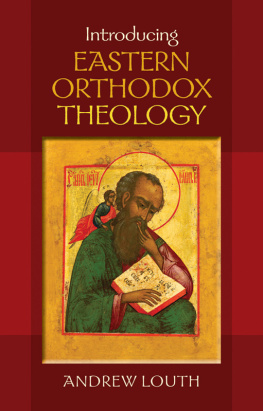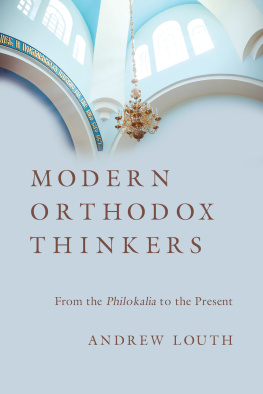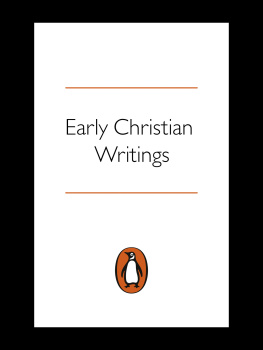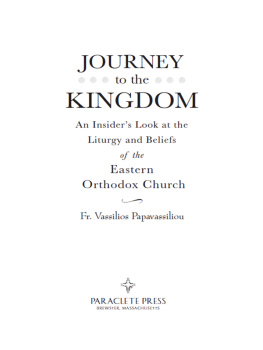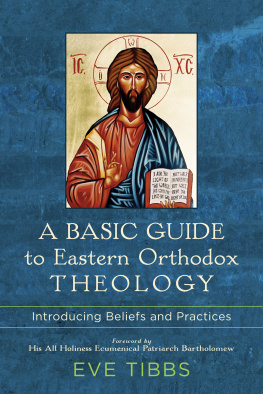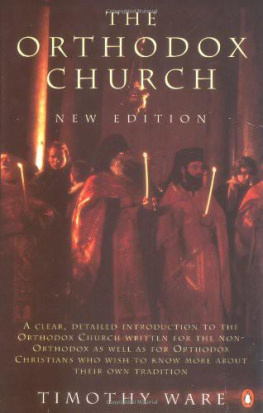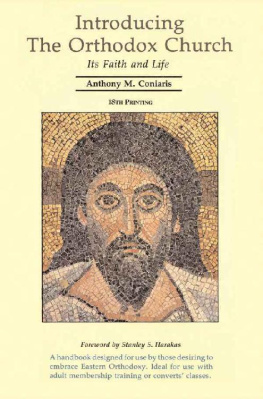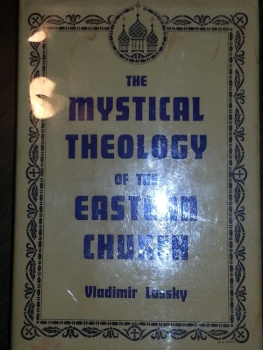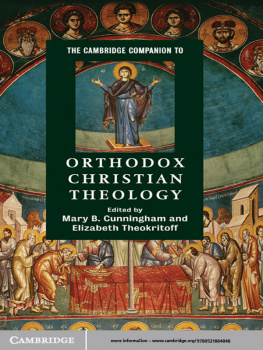Andrew Louth - Introducing Eastern Orthodox Theology
Here you can read online Andrew Louth - Introducing Eastern Orthodox Theology full text of the book (entire story) in english for free. Download pdf and epub, get meaning, cover and reviews about this ebook. year: 2013, publisher: IVP Academic, genre: Religion. Description of the work, (preface) as well as reviews are available. Best literature library LitArk.com created for fans of good reading and offers a wide selection of genres:
Romance novel
Science fiction
Adventure
Detective
Science
History
Home and family
Prose
Art
Politics
Computer
Non-fiction
Religion
Business
Children
Humor
Choose a favorite category and find really read worthwhile books. Enjoy immersion in the world of imagination, feel the emotions of the characters or learn something new for yourself, make an fascinating discovery.
- Book:Introducing Eastern Orthodox Theology
- Author:
- Publisher:IVP Academic
- Genre:
- Year:2013
- Rating:4 / 5
- Favourites:Add to favourites
- Your mark:
- 80
- 1
- 2
- 3
- 4
- 5
Introducing Eastern Orthodox Theology: summary, description and annotation
We offer to read an annotation, description, summary or preface (depends on what the author of the book "Introducing Eastern Orthodox Theology" wrote himself). If you haven't found the necessary information about the book — write in the comments, we will try to find it.
Introducing Eastern Orthodox Theology — read online for free the complete book (whole text) full work
Below is the text of the book, divided by pages. System saving the place of the last page read, allows you to conveniently read the book "Introducing Eastern Orthodox Theology" online for free, without having to search again every time where you left off. Put a bookmark, and you can go to the page where you finished reading at any time.
Font size:
Interval:
Bookmark:
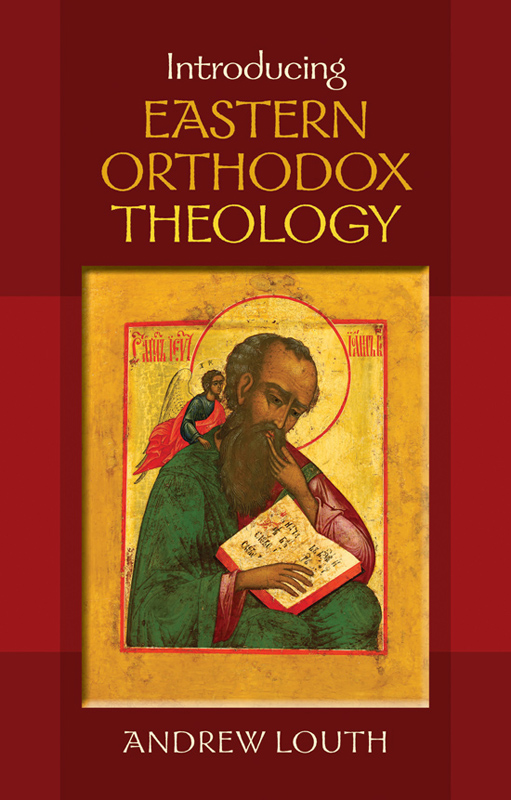
Andrew Louth is Professor Emeritus of Patristic and Byzantine Studies at Durham University and also Visiting Professor of Eastern Orthodox Theology at the Amsterdam Centre of Eastern Orthodox Theology (ACEOT), in the Faculty of Theology, the Free University, Amsterdam. He is also a priest of the Russian Orthodox Diocese of Sourozh (Moscow Patriarchate), serving the parish in Durham. He holds degrees from the University of Cambridge (MA), the University of Edinburgh (M.Th.) and the University of Oxford (DD). Before teaching at Durham, he taught at the University of Oxford and at Goldsmiths College, University of London.
He is the author of several books, including The Origins of the Christian Mystical Tradition: Plato to Denys (1981, second edition 2007), Discerning the Mystery (1983), Denys the Areopagite (1989), Maximus the Confessor (1996), St John Damascene: Tradition and Originality in Byzantine Theology (2002) and Greek East and Latin West: the Church, AD 6811071 (2007), as well as many articles.
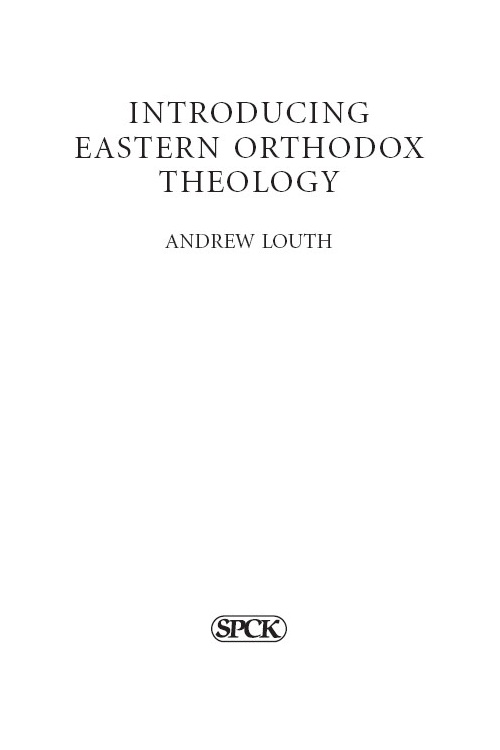
First published in Great Britain in 2013
Society for Promoting Christian Knowledge
36 Causton Street
London SW1P 4ST
www.spckpublishing.co.uk
Copyright Andrew Louth 2013
All rights reserved. No part of this book may be reproduced or transmitted in any form or by any means, electronic or mechanical, including photocopying, recording, or by any information storage and retrieval system, without permission in writing from the publisher.
SPCK does not necessarily endorse the individual views contained in its publications.
The author and publisher have made every effort to ensure that the external website and email addresses included in this book are correct and up to date at the time of going to press. The author and publisher are not responsible for the content, quality or continuing accessibility of the sites.
Scripture quotations are the authors own translation.
The publisher and author acknowledge with thanks permission to reproduce extracts from the following:
The Divine Liturgy of our Father among the Saints Basil the Great and < www.anastasis.org.uk/baptism.htm >, copyright Archimandrite Ephrem Lash. Used by permission.
The Akathist Hymn, in The Orthodox Prayer Book , copyright The Fellowship of St Alban and St Sergius and Archimandrite Ephrem Lash. Used by permission.
David Jones, The Anathemata , copyright Faber and Faber Ltd and the Estate of David Jones. Used by permission of Faber and Faber Ltd; permission sought from the Estate of David Jones.
Every effort has been made to seek permission to use copyright material reproduced in this book. The publisher apologizes for those cases where permission might not have been sought and, if notified, will formally seek permission at the earliest opportunity.
British Library Cataloguing-in-Publication Data
A catalogue record for this book is available from the British Library
ISBN 9780281069651
eBook ISBN 9780281069668
Typeset and eBook by Graphicraft Limited, Hong Kong
For Wendy
Contents
This book originated as a series of monthly public lectures delivered in the academic year 20112012 at the Amsterdam Centre for Eastern Orthodox Theology (ACEOT) in the Faculty of Theology in the Free University of Amsterdam, of which I was (and still am) a visiting professor. The lectures were, from the beginning, intended to be turned into the chapters of a book. I am very grateful for all those who turned up on Thursday evenings to listen to me, and to the discussions that took place following each lecture. I am especially grateful to Dr Michael Bakker, for inviting me to take up the visiting chair on the inauguration of the Centre in 2010. Various people have helped me to effect the transition from the ephemeral form of a lecture series to the more enduring form of a book, especially Fr John Behr, Wendy Robinson and Anna Zaranko. It still retains some of the informal tone of the original lectures; I hope the reader will be indulgent.
Andrew Louth
Feast of the Apostle Philip
Labels are sometimes a problem. Nobody wants to be labelled, and yet we use labels all the time, as a way of simplifying the world in which we live, a way of introducing some order and identity. Orthodox in the West have a particular problem with the labels others apply and they accept. Orthodox by itself, in England and America, is usually taken to designate outside a few, rather specialized contexts Orthodox Judaism, as opposed to Conservative, Liberal or Reform Judaism. Some Orthodox use Christian Orthodox to avoid that, or speak of themselves as belonging to the Orthodox Church. But there is no body called the Christian Orthodox Church, or even the Orthodox Church; it is well known that there is the Greek Orthodox Church, the Russian Orthodox Church, the Romanian Orthodox Church and so on.
So who are the Orthodox? I have used what is probably still the most generally accepted term, Eastern Orthodox, though over the last century, the emigration of Orthodox from traditionally Orthodox countries to the West, their settlement here and the consequent attraction to their ranks of people with a cultural background that is entirely Western, means that there are now many members of the Orthodox Church who are uncomfortable with being thought Eastern, for there is nothing at all about them that is Oriental. So it seems to me that the best thing to do is to start by explaining whom I take the Eastern Orthodox to be, rather than assuming that the label will not be misunderstood.
There seem to me to be three ways of approaching this question of identity and definition. The first is identifying those I am including under the title Eastern Orthodox, by providing a list comprehensive, though not exhaustive. The second could be called historical: Eastern Orthodox are who they are as the result of their history. Those of a Western background who have adopted Eastern Orthodoxy have, in some way, placed themselves in debt to that history. The third way might be to ask what is distinctive about Eastern Orthodoxy. I want to pursue each of these avenues one by one; in fact, I think, they will be found to lead one into another.
First of all, then, Eastern Orthodox means belonging to the family of Eastern Orthodox Churches, as opposed to the various families of Western Churches, and also to the Oriental Orthodox Churches. The Eastern Orthodox Churches, in this sense, are found to be various national groups. There are the Greek Orthodox: both in Greece itself, the Greek islands including Cyprus, but also the Greek diaspora, mostly to be found in Europe, the United States and Australia the result of emigration from what is now Turkey, as well as Greece, and, especially in the case of Great Britain, from Cyprus as well as Greek Orthodox under various ancient patriarchs (Antioch, Alexandria, Jerusalem). The leader of the Greek Orthodox is the cumenical Patriarch of Constantinople, now called Istanbul, in Turkey, where he still resides. (The title cumenical will be explained later.) There are also the Russian Orthodox, the Romanian Orthodox, the Bulgarian Orthodox, the Serbian Orthodox all under patriarchs as well as the Georgian Orthodox (under a Patriarch-Catholicos), and smaller churches in a variety of countries for example, Albania, Estonia, Finland, Poland, the Czech lands and Slovakia. Many of these national groups also have significant numbers abroad, in the diaspora, mostly Western Europe and America, but elsewhere too.
Font size:
Interval:
Bookmark:
Similar books «Introducing Eastern Orthodox Theology»
Look at similar books to Introducing Eastern Orthodox Theology. We have selected literature similar in name and meaning in the hope of providing readers with more options to find new, interesting, not yet read works.
Discussion, reviews of the book Introducing Eastern Orthodox Theology and just readers' own opinions. Leave your comments, write what you think about the work, its meaning or the main characters. Specify what exactly you liked and what you didn't like, and why you think so.

